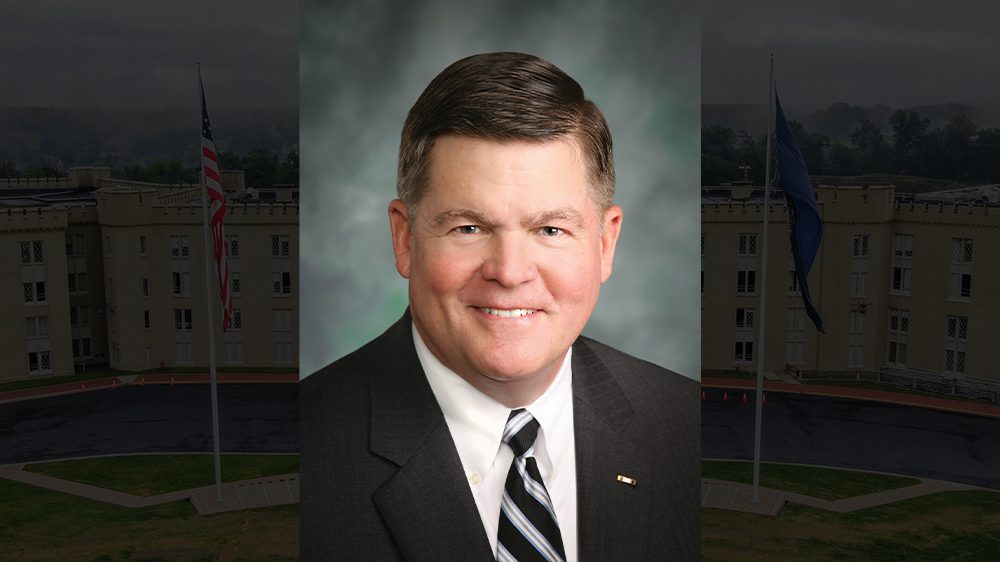Lynch ’69 Continues Service as MOAA General Counsel

Maj. Gen. Joseph “Joe” Lynch ’69 still carries the memories and lessons of the Institute with him, including his initiative to serve.

Maj. Gen. Joseph “Joe” Lynch ’69 still carries the memories and lessons of the Institute with him, including his initiative to serve.
From launching a rock band and meeting his wife during summer school at VMI to excelling in law school, retired U.S. Air Force Maj. Gen. Joseph “Joe” Lynch ’69 still carries the memories and lessons of the Institute with him, including his initiative to serve.
Though he originally dreamed of being a fighter pilot, Lynch changed course after a failed eye exam and instead entered a successful career as an Air Force judge advocate. After 10 years active duty, Lynch spent 22 years in the Air Force Reserve while also serving as a senior civilian attorney for the Navy Department. He retired from government service in 2003.
Today, Lynch serves military servicemen and servicewomen as well as their families through his position as general counsel and corporate secretary for the Military Officers Association of America.
While he was born in Syracuse, New York, Lynch spent much of his childhood living all over the world as the son of a military officer. He first came to VMI after his father’s encouragement, as the elder Lynch wanted his son to be prepared to serve as an officer in the ongoing Vietnam War.
“I think my story is very similar to a lot of other VMI cadets whose fathers were in the military,” said Lynch. “My dad served in World War II and subsequently stayed in, making his career with the Air Force. When it came time for me to go to college, he said, ‘You’re a young male, and whether you like it or not, you’re going to end up going in the military. There’s a war going on in Vietnam, and it’s my obligation as your father to see that you are prepared to survive that any way that you can.’”
After witnessing young men in combat with little military experience in World War II, Lynch’s father felt it was important that his son attend VMI where he would gain self-discipline and leadership skills. Because of the Vietnam draft, Lynch’s father felt it was his obligation to ensure his son was as prepared as possible for the demands of military service.
“My dad said, ‘If you learn to be a good, solid professional military officer, you’ll survive military service and be successful for the rest of your life,’” reflected Lynch.
While taking summer school classes at VMI in 1967, Lynch began a summer rock and roll group with his two VMI roommates in which he played drums. By the end of the summer, he had met his future wife, Pat, at one of their concerts in Lynchburg; Pat was his Ring Figure date that fall, and they were married his last year of law school.
“I look back and reflect upon it, and there were times at VMI when things were just going right, and I felt like a million dollars. I was proud I was there and felt I was doing things to move myself along in my life and career. Then, there were many other times when my experience was extraordinarily difficult, facing some major disappointments that I didn’t expect.”
One of those disappointments was learning that his eyesight would prevent him from entering the Air Force as a fighter pilot. From this disappointment came his pivotal career decision to go to law school and serve as a lawyer instead.
Lynch attended law school at Emory University in Atlanta, Georgia, and graduated in 1971.
The self-discipline and determination VMI taught him carried him through law school, as well. To make ends meet and pay for law school, Lynch maintained a part-time job in Atlanta delivering newspapers. With this job, he was able to pay his living expenses and save a little to pay tuition, in addition to a couple of student loans.
“I look back and reflect upon it, and there were times at VMI when things were just going right, and I felt like a million dollars. I was proud I was there and felt I was doing things to move myself along in my life and career."
Maj. Gen. Joseph “Joe” Lynch ’69
After graduating, he served 10 years on active duty in the Air Force as a judge advocate. Lynch spent 22 more years in the Air Force Reserve. After retiring from government service in 2003, he began working in consulting until a friend called him and suggested he join him at MOAA as its general counsel.
With 350,000 members throughout the world, MOAA is the largest association of military officers and a pivotal lobby on Capitol Hill to protect the benefits of military personnel of all ranks and grades.
“MOAA serves the military community by advocating for active duty service members to get pay that is comparable to civilian pay raises in the private sector and ensuring health care for military personnel who are retired and can no longer access military treatment facilities,” Lynch explained. “We also provide financial assistance and scholarships to the children of military personnel. Some of these scholarships are set aside specifically for children of military personnel when a parent has died serving on active duty.”
In one recent example, MOAA advocated for better benefits for spouses and families of service members killed in action. He explained that spouses of active duty and retired military members can receive survivor benefits equal to 55% of the military member’s base pay if they die. At the same time, the families and/or spouses of deceased military service members also receive dependency and indemnity compensation from the Department of Veterans Affairs. However, many years ago, Congress decided to deduct the VA compensation from the survivor benefit. As an unintended consequence of the deduction, the families and spouses of those killed in action faced a real financial hardship.
“This was costing some of our spouses, especially the junior spouses, to lose the entire survivor benefit,” said Lynch. “At MOAA, we worked really hard on Capitol Hill to get legislation to fix that because it affected just about every spouse of a deceased military member who was killed in combat.”
In December 2019, MOAA persuaded Congress to pass legislation that removed the offset between the two pensions. Now, the family members and spouses of those killed while on active duty get both the survivor benefit plan as well as the veterans’ benefits they are entitled to.
In another example, MOAA obtained repeal of a bipartisan budget deal that put an end to a budget-balancing technique the government was using at the time in which 1% of retirement pay for service members was deducted to balance the budget. MOAA was able to correct this injustice and save retired service members as much as $100,000 in retirement benefits over their lifetimes.
“Finally, we were able to restore the percentage and ensure these veterans and their families could depend on this retirement. We consider it one of our major accomplishments for the military community,” Lynch explained.
For Lynch, lobbying and advocacy on the part of MOAA is vital, especially at a time when few American citizens serve in the military. “Today, the statistic is close to 99% of Americans who have never served in the military,” said Lynch. “[M]any people don’t really understand what military service is and what it demands of service members and their families.”
He sees part of MOAA’s work as educating the public on what military service is and how it affects not only those who serve but also their families. He finds that with this understanding, people are quickly more supportive.
As he continues to serve as general counsel, Lynch finds his work worthwhile and enriching.
“I find my working with MOAA very rewarding. While it is a lot of very detailed legal work, the efforts we make are very important to our active duty soldiers, veterans, and military families,” said Lynch. “I enjoy it because I’m working for the military community.”

The assistant editor assists the editor-in-chief in various tasks relating to the production of quarterly and monthly publications, as well as prepares written materials for publication. The assistant editor serves as liaison between class agents and chapter presidents and the Agencies’ publications, as well as provides backup photography for events.